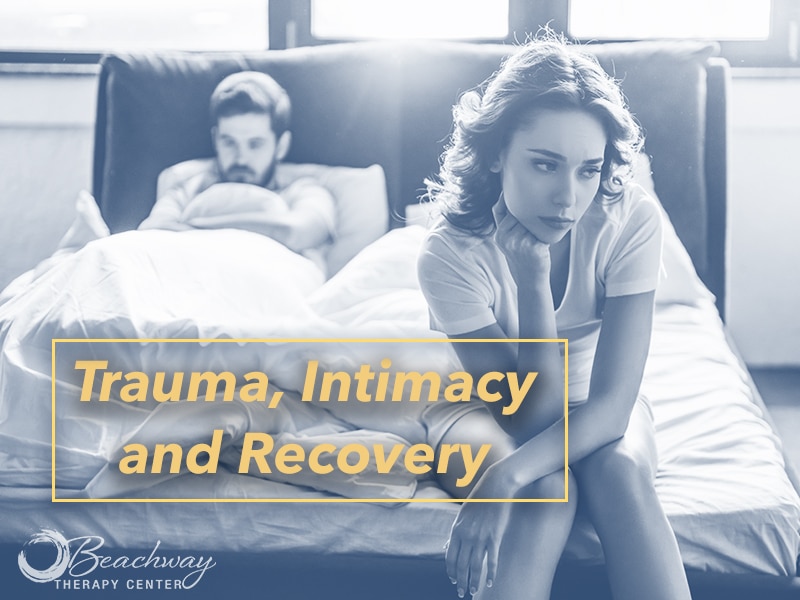
Intimacy Trauma and Recovery
Florida PTSD and Trauma Treatment Center
Understanding and Overcoming the Barriers to Intimacy in Recovery
Post-traumatic stress disorder (PTSD) is one of the most misunderstood mental health conditions in America. The Anxiety and Depression Association of America (ADAA) estimates that roughly 7.7 million Americans suffer from PTSD, and that number is likely much higher when undiagnosed case numbers are considered. At Beachway Therapy Center, we understand how mental disorders like PTSD can negatively impact many aspects of a person’s life – physically, mentally, emotionally, and socially. Our mental health treatment programs are individualized for each patient following an initial assessment. We use a combination of traditional treatment and counseling and holistic care to treat conditions like PTSD and help facilitate healing.
Many people also suffer from trauma, which can occur from one single shocking or emotionally significant event or after a series of events. Like PTSD, trauma can lead to depression or anxiety, substance abuse disorders, and other debilitating behaviors. Individuals suffering from PTSD and trauma are often at the highest risk of developing alcohol or substance abuse problems because of the overwhelming need to make the unpleasant symptoms disappear.
PTSD and trauma are unpredictable disorders because the symptoms and behavior are often different in each case. Because of this, it’s important to seek specialized care from qualified professionals like those at Beachway, who have experience helping those with the disorder.

Is Trauma the Same as PTSD?
Trauma is different from PTSD and can impact individuals in ways that are completely unrelated to PTSD. PTSD is a mental health disorder that can develop from traumatic events. Trauma can stem from various traumatic events, both singular and recurring, intentional and unintentional.
Some common traumatic events can include:
Grief and loss:
Abuse:
Life circumstances:
Because individuals process harmful experiences differently, there is no single “type” of trauma that is worse or more damaging. Each patient’s traumatic experience is treated with great care, targeted therapy, clinical support and a holistic approach.

How Does PTSD Lead to Substance Abuse?
Drugs or alcohol can become a crutch for people in pain. Those suffering from trauma and PTSD often do not come forward to ask for treatment and instead choose to self-medicate with substances to dull the intense and uncomfortable feelings associated with the disorder. For example, those struggling with PTSD may have trouble sleeping, so they reach for sleep aids to get a restful night’s sleep and may become addicted.
Using drugs or alcohol to fix any personal issues is not a viable solution. Substance abuse worsens PTSD symptoms. In most cases, alcohol addiction with PTSD leads to intense feelings of depression, anger, and isolation. Individuals may then turn to more significant drug use for intense binges to get the same results.


Symptoms of Substance Abuse
Identifying substance abuse often requires an objective look at the patient’s various habits and opinions. Just like PTSD, the symptoms of addiction and substance abuse vary in each individual; however, there are several warning signs, including:
-
- Losing interest in hobbies and activities.
- Failing to meet work or family commitments.
- Gaining or losing weight.
- Feeling the need to drink or use drugs to be accepted, liked, or loved.
- Hiding habits and being secretive.
- Engaging in risky behavior such as driving under the influence.
- Losing contact with family and friends, increasingly isolated.
- Legal difficulties.

Dual Diagnosis: Trauma Informed Therapy to Stop Addiction
Drug and alcohol treatment does not always include trauma-focused therapy—but there is a direct correlation between individuals with substance abuse conditions and those who have suffered trauma of any kind. Individuals who have experienced any trauma that is not addressed during drug and alcohol treatment have a greater chance of relapse. At Beachway, we take a holistic approach to this Dual Diagnosis by implementing proven, trauma-informed care to help clients process experiences that trigger vulnerabilities to substances.
Trauma-informed therapy gives individuals the tools to understand why their addiction and/or mental health condition became uncontrollable. With this “why,” patients who have suffered from trauma are better prepared to engage in therapies that dig deep and address those experiences in a productive, effective way, supporting their drug and/or alcohol recovery.

Beachway’s Holistic Approach
We offer a well-rounded program with a variety of services. Trauma therapy utilizes experiential therapies to encourage patients to participate fully and engage in the treatment process. Therapies can include inner-child work, psychodrama, process therapy, talk therapy and meditation. Individuals participating in trauma-informed care can expect to meet with a group throughout the week. Patients also work on individual assignments that promote self-discovery and empowerment. The deeper one goes to address the root cause, the more successful the healing from trauma and substance abuse.
When individuals dig deep during experiential therapies, they might relive those traumas or feel a sense of shame, guilt, sadness or anger. Patients often need help processing their emotions, memories and traumas effectively. Beachway is fully prepared for these natural, healthy responses to therapy, with both clinical and therapeutic support.
This educational (or factual) phase of the program helps identify areas of trauma, such as:
- What is the trauma?
- How does it manifest?
- What are the effects?
We also incorporate a process component, typically a six-week program, which begins after stabilization. In this phase of the program, patients meet twice a week as a group and participate in multiple one-on-one sessions with their therapist.
Our holistic approach focuses on healing the client’s mind, body, and soul through personalized treatment and aftercare plans. It can be the most effective way to treat dual-diagnosis patients. In addition to these groups, we also provide holistic therapies, including:
- EMDR
- Somatic Breathwork
- Equine therapy
- Psychodrama & art therapy
- Faith-based healing
- Nutritional counseling
- Yoga and Breathwork
We also believe in encouraging Beachway patients to regain control of their health through physical activity. The holistic approach helps yield permanent results and helps them prepare for a sober and healthy future.
In addition to introducing patients to personalized treatment plans, we also offer personalized aftercare options. Aftercare acts as a transition period where clients can get a head start on life out of rehab. Some key aftercare features include placement in a sober living environment, access to group therapy, finding a job or post-secondary school, and more. We also recommend a trauma therapist for patients to continue their work.
Learn more about trauma and recovery and how trauma-informed care can help a patient to embrace drug and alcohol treatment and succeed in long-term recovery. Call Beachway today.

How Much Does Trauma Rehab Cost?
Trauma rehabilitation is a critical step in a person’s road to recovery. Treatment for mental health conditions like PTSD may be covered by your insurance. To find out whether your treatment may be fully or partially covered, please don’t hesitate to give our office a call at 877-284-0353. A member of our team will be happy to speak with you regarding your insurance company and what you might expect to pay for treatment.
Trauma-informed therapy gives individuals the tools to understand why their addiction and/or mental health condition became uncontrollable. With this “why,” patients who have suffered from trauma are better prepared to engage in therapies that dig deep and address those experiences in a productive, effective way, supporting their drug and/or alcohol recovery.


Other Ways to Help with PTSD and Addiction
Living with PTSD has many challenges. As a chronic illness, there is no definite cure for the disease. It will get better with time and with specific management tools and coping methods. There is no overnight fix for the disorder, and results are gradual as the recovery journey unfolds.
Learn more about PTSD and Trauma Treatment Today CALL: 877-284-0353


